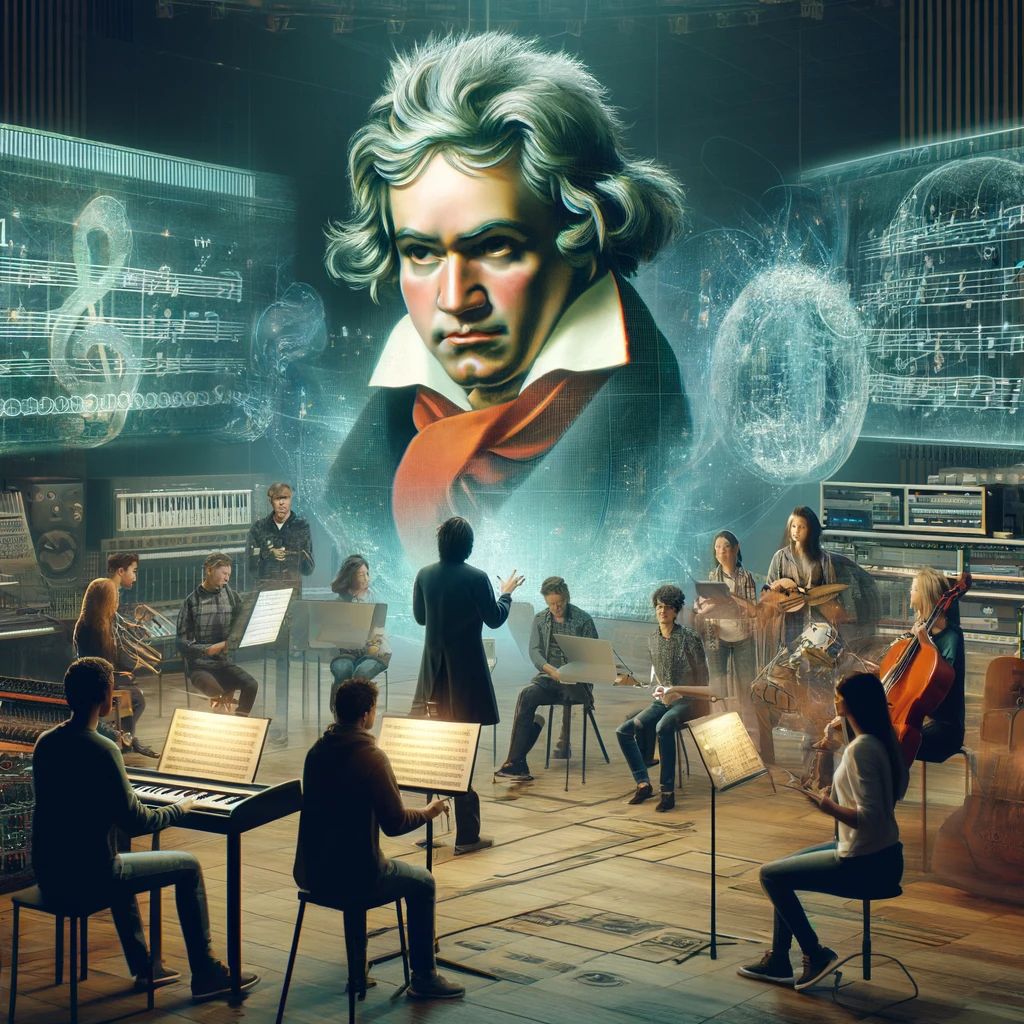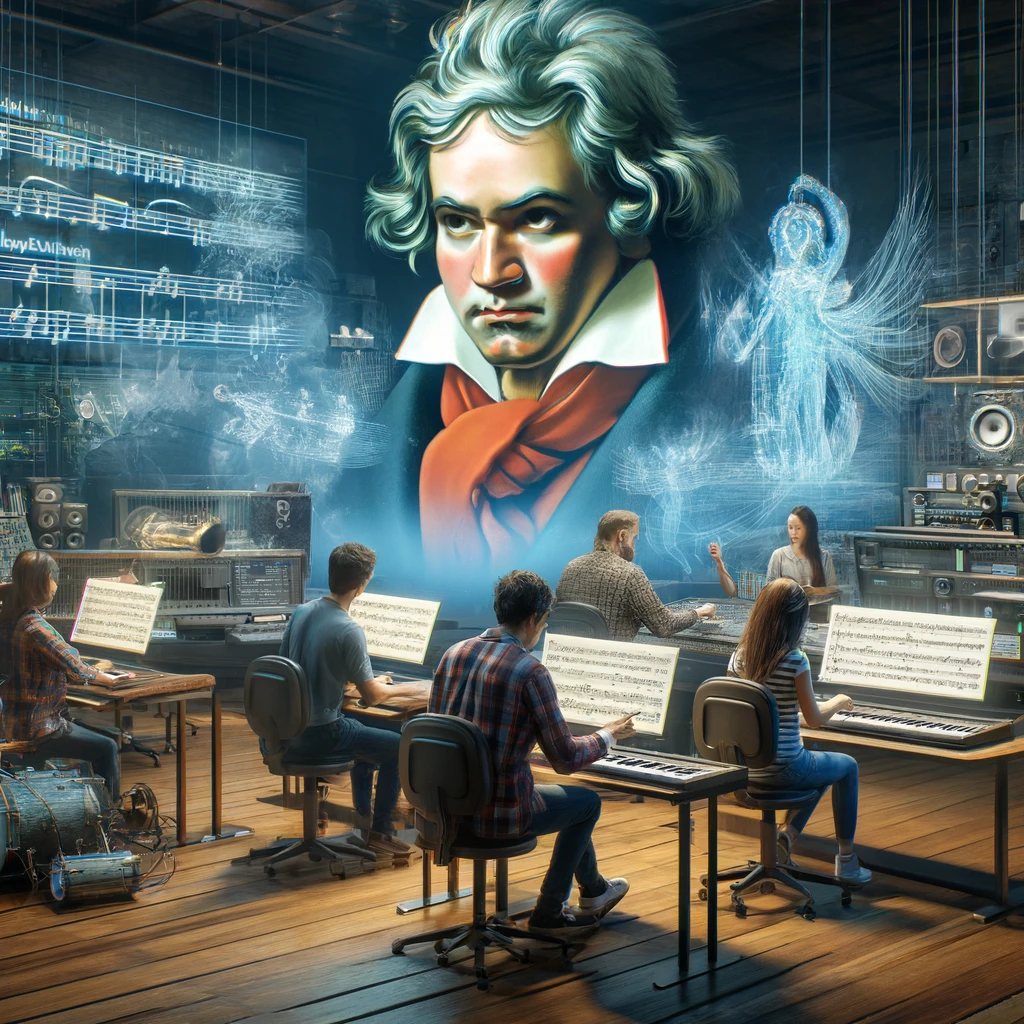
Beethoven’s Legacy: Modern Composers Reflect
Ludwig van Beethoven, a name synonymous with musical genius, has influenced countless musicians and composers across the centuries. Even today, his compositions and musical philosophy continue to resonate, inspiring modern composers in a variety of unexpected ways. In this article, we delve into how contemporary musicians interpret Beethoven’s legacy and the impact of his work on their creative processes.
Beethoven’s Timeless Influence
Beethoven’s music, characterized by its emotional depth and innovative techniques, broke new ground in the transition from the Classical to the Romantic era in music. His compositions, like the iconic Fifth Symphony and the profound late string quartets, pushed the boundaries of music, challenging future generations to explore new possibilities in sound and structure.
Modern composers often cite Beethoven’s courage in experimentation and expression as a pivotal influence on their work. For instance, the way Beethoven used motifs, developed harmonic layers, and his approach to musical storytelling opened new avenues for thematic development in music.
Contemporary Reflections on Beethoven’s Work
Today, composers across genres reflect on how Beethoven has impacted their work. Many see his ability to convey deep human emotions and his relentless innovation as benchmarks for their compositions.
Emotional Depth and Complexity
Alice Trent, a notable film score composer, shares how Beethoven’s Ninth Symphony influenced her approach to crafting emotional landscapes in cinema. “Beethoven’s ability to layer emotions within a single piece was revolutionary. His Ninth Symphony is a masterclass in building and releasing tension, which is crucial in film music,” she explains.
Innovation in Structure
John Rivers, a composer known for blending electronic and classical music, points out how Beethoven’s structural innovations inspire his work. “Beethoven was not just composing; he was reinventing forms. His late quartets, for instance, play with structure in a way that feels very modern. I try to echo that spirit of innovation in my electronic symphonies,” says Rivers.
Beethoven’s Broader Impact on Music Genres
Beethoven’s influence is not limited to classical music. Jazz musicians, film score composers, and even pop music producers find inspiration in his compositions. His techniques, particularly his use of rhythm and dynamics, have permeated these genres, offering a timeless toolkit for musical expression.
Jazz Interpretations
Jazz pianist Michael Li comments, “Beethoven’s use of improvisation, especially in his piano sonatas, parallels the improvisational nature of jazz. His bold dissonances and rhythmic intensity are elements that I incorporate into my jazz compositions.”
Film and Popular Music
In film, Beethoven’s impact is often felt in the dramatic structuring of musical scores. Film composers like Trent use Beethoven’s techniques to enhance narrative and emotional impact, ensuring that the music aligns closely with cinematic themes.
Educational Initiatives and Collaborations
Recognizing the importance of Beethoven’s legacy, many contemporary composers are involved in educational initiatives that encourage young musicians to engage with Beethoven’s work. Workshops, masterclasses, and collaborative projects are common, where experienced composers share how Beethoven’s methodologies can be adapted to modern musical contexts.
Collaborative Projects
An example of such initiatives is the “Beethoven Remix Project,” where composers from diverse backgrounds come together to create new works inspired by Beethoven’s compositions. This project not only celebrates Beethoven’s influence but also demonstrates how his work can be a foundation for new, innovative musical explorations.
The Future of Beethoven’s Legacy
As we move further into the 21st century, Beethoven’s influence remains a powerful force in music. Composers continue to draw from his work, finding relevance in his innovative spirit and emotional depth. His legacy prompts a dialogue between the past and present, challenging today’s composers to reinterpret and reinvent.
The enduring relevance of Ludwig van Beethoven in the world of modern music is a testament to his genius. His work continues to inspire, challenge, and shape the musical landscape, proving that true artistry transcends time. For contemporary composers, Beethoven is not just a historical figure; he is a continual presence in the conversation about what music is and what it could be.
Beethoven’s legacy is far from a closed book. It is an ongoing project, an invitation to innovation and emotional expression that modern composers and musicians continue to accept with enthusiasm. As they respond to his influence, they keep the spirit of Beethoven alive in the music of today and tomorrow.

As the musical world evolves with technological advances and new artistic trends, Beethoven’s works serve as a cornerstone for creative experimentation and academic study. His influence is evident not only in the compositions of others but also in the broader discourse about music’s role in society.
Integrating Technology with Tradition
In an age where digital technology plays a central role in music production and distribution, composers find Beethoven’s techniques particularly adaptable to new mediums and sounds. Electronic composer Emily Sato explains, “Using synthesizers and digital audio workstations, I can manipulate motifs in a way that echoes Beethoven’s transformative use of thematic development. His work has a structural integrity that survives even in the most modern adaptations.”
Academic Perspectives
Music scholars also weigh in on Beethoven’s enduring relevance. Dr. Henry Clarkson, a professor of Musicology, highlights, “Beethoven’s compositions are not just artifacts of the past; they are active educational tools that help students understand the evolution of musical thought and the expressive potential of human creativity.”
Global Impact and Cultural Exchange
Beethoven’s music transcends cultural and national boundaries, making it a universal language that speaks to diverse audiences. This global appeal is particularly significant in cross-cultural collaborations and festivals where Beethoven’s work is often featured to bridge cultural divides.
Cross-Cultural Collaborations
Composer Aisha Bello, who incorporates African musical elements into classical frameworks, discusses the universal appeal of Beethoven’s music. “In my collaborations with artists from different cultural backgrounds, we often turn to Beethoven’s work as a common ground. His music has a way of expressing universal human emotions that resonate across cultures.”
Advocacy and Social Impact
Beyond the concert hall and the classroom, Beethoven’s music has found a place in social advocacy, with composers using his work as inspiration to address contemporary issues such as social justice, mental health, and environmental concerns.
Music as Advocacy
Composer Lucas Nguyen, known for his work on climate change awareness, remarks, “Beethoven faced many personal challenges, yet he communicated hope and resilience through his music. I strive to channel that same energy into compositions that speak on environmental issues and inspire action.”
Reflecting on Personal Experiences
For many composers, Beethoven’s music is not just professionally inspiring but also personally significant. They relate to his struggle with deafness, his isolation from society, and his relentless pursuit of artistic excellence despite numerous obstacles.
Personal Journeys
Film composer Alice Trent shares, “When I faced a hearing impairment, Beethoven’s story gave me hope. His ability to compose profound music despite his deafness encouraged me to continue pursuing my passion for music. His life reminds us that art can thrive against all odds.”
Conclusion: A Living Legacy
The dialogue between Beethoven’s legacy and modern composers is vibrant and multifaceted. It bridges history with contemporary practice, illustrating how classical music can remain relevant in an ever-changing world. Through educational programs, innovative projects, and personal reflections, today’s composers not only preserve but also reimagine Beethoven’s legacy.
As we continue to explore and appreciate Beethoven’s vast influence, it is clear that his music will continue to inspire and challenge composers for generations to come. The Beethoven Project is not just about looking back; it’s about looking forward, using the timeless art of the past to enrich the music of the future.